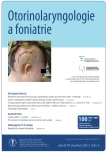Grisel’s syndrome – case report
Authors:
Kossuthová N. 1; Mejzlík J. 1,2; Zadrobílek K. 2,3; Dědková J. 4; Chrobok V. 1,2
Authors‘ workplace:
Klinika otorinolaryngologie a chirurgie hlavy a krku, FN Hradec Králové
1; Lékařská fakulta UK v Hradci Králové
2; Neurochirurgická klinika, FN Hradec Králové
3; Radiologická klinika, FN Hradec Králové
4
Published in:
Otorinolaryngol Foniatr, 70, 2021, No. 2, pp. 97-101.
Category:
Case Reports
doi:
https://doi.org/10.48095/ccorl202197
Overview
Introduction: By definition from the literature, Grisel’s syndrome is described as non-traumatic rotational atlantoaxial instability between C1 and C2 vertebrae. It can occur during an infection of a soft tissue in the cervicocranial region or after an operation in the ENT region. Because of the frequent occurrence after operations, we inclined to the definition which includes a traumatic subluxation as a cause of origin, and it’s not defined as non-traumatic only. The instability manifests itself with abnormal head posture that is called torticollis. Increased incidence in adolescence is more common because of a greater ligamentous laxity of the joint capsules, increased perfusion of antlantoaxial regions and longer alar ligaments. In this article, the case of a child with Grisel’s syndrome after adenotomy is described. The pathophysiology, symptomatology, diagnostic management and treatment are discussed.
Keywords:
Grisel’s syndrome – torticollis – atlantoaxial instability – adenotomy
Sources
1. Yu KK, White DR, Weissler MC et al. Nontraumatic atlantoaxial subluxation (Grisel syndrome): a rare complication of otolaryngological procedures. Laryngoscope 2003; 113(6): 1047–1049. Doi: 10.1097/ 00005537-200306000- 00024.
2. Deichmueller CM, Welkoborsky HJ. Grisel‘ s syndrome – a rare complication following “small” operations and infections in the ENT region. Eur Arch Otorhinolaryngol 2010; 267(9): 1467–1473. Doi: 10.1007/ s00405-010-1241-z.
3. Aladag Ciftdemir N, Eren T, Ciftdemir M. A rare cause of torticollis: Grisel syndrome. J Trop Pediatr 2018; 64(3): 245–248. Doi: 10.1093/ tropej/ fmx050.
4. Komínek P, Chrobok V, Astl J. Záněty hltanu. 2. vyd. Havlíčkův Brod: Tobiáš 2016.
5. Gourin CG, Kaper B, Abdu WA et al. Nontraumatic atlanto-axial subluxation after retropharyngeal cellulitis: Grisel‘s syndrome. Am J Otolaryngol 2002; 23(1): 60–65. Doi: 10.1053/ ajot.2002.28781.
6. Krtičková J, Havigar J, Ryšková L et al. Hluboké krční záněty jako komplikace zánětu hltanu (retrospektivní studie). Otorinolaryngol Foniatr 2017; 66(1): 7–11.
7. Corluy L, Pison L, Lauweryns P et al. An unusual non-traumatic atlantoaxial subluxation in an adult patient: Grisel‘s syndrome. Clin Rheumatol 2004; 23(2): 182–183. Doi: 10.1007/ s10067-003-0834-y.
8. Neal KM, Mohamed AS. Atlantoaxial rotatory subluxation in children. J Am Acad Orthop Surg 2015; 23(6): 382–392. Doi: 10.5435/ JAAOS-D-14-00115.
9. Osiro S, Tiwari KJ, Matusz P et al. Grisel‘s syndrome: a comprehensive review with focus on pathogenesis, natural history, and current treatment options. Childs Nerv Syst 2012; 28(6): 821–825. Doi: 10.1007/ s00381-012-1706-z.
10. Allegrini D, Autelitano A, Nocerino E et al. Grisel‘s syndrome, a rare cause of anomalous head posture in children: a case report. BMC Ophthalmol 2016; 16: 21. Doi: 10.1186/ s12886-016-0197-1.
11. Harley EH, Collins MD. Neurologic sequelae secondary to atlantoaxial instability in Down syndrome. Implications in otolaryngologic surgery. Arch Otolaryngol Head Neck Surg 1994; 120(2): 159–165. Doi: 10.1001/ archotol. 1994.01880260031007.
12. Welinder NR, Hoffmann P, Hakansson S. Pathogenesis of non-traumatic atlanto-axial subluxation (Grisel‘s syndrome). Eur Arch Otorhinolaryngol 1997; 254(5): 251–254. Doi: 10.1007/ BF00874099.
13. Tschopp K. Monopolar electrocautery in adeno - idectomy as a possible risk factor for Grisel‘s syndrome. Laryngoscope 2002; 112(8 Pt 1): 1445–1449. Doi: 10.1097/ 00005537-200208000-00022.
14. Börekci A, Çelikoğlu E. Surgical treatment of Grisel syndrome: a pediatric case report and review of the literature. South Clin Ist Euras 2017; 28(3): 245–248. Doi: 10.14744/ scie.2017.68442.
15. Fielding JW, Hawkins RJ. Atlanto-axial rotatory fi xation. (Fixed rotatory subluxation of the atlanto-axial joint). J Bone Joint Surg Am 1977; 59(1): 37–44.
16. Rybnikár T, Málek V, Čelakovský P et al. Tortikolis při Griselově syndromu – kazuistiky. Cesk Slov Neurol N 2013; 76/125(2): 246–249.
17. Dagtekin A, Kara E, Vayisoglu Y et al. The importance of early dia gnosis and appropriate treatment in Grisel‘s syndrome: report of two cases. Turk Neurosurg 2011; 21(4): 680–684. Doi: 10.5137/ 1019-5149.JTN .3120-10.1.
18. Crossman JE, David K, Hayward R et al. Open reduction of pediatric atlantoaxial rotatory fi xation: long-term outcome study with functional measurements. J Neurosurg 2004; 100(3 Suppl Spine): 235–240. Doi: 10.3171/ spi.2004.100.3.0235.
Labels
Audiology Paediatric ENT ENT (Otorhinolaryngology)Article was published in
Otorhinolaryngology and Phoniatrics

2021 Issue 2
Most read in this issue
- Biological therapy of chronic rhinosinusitis
- Grisel’s syndrome – case report
- Surgical treatment of benign parotid gland tumors in the years 2014–2018 at the ENT department of Hospital České Budějovice, a.s.
- Neuromonitoring of the recurrent laryngeal nerve in thyroid gland surgery – results and experiences
